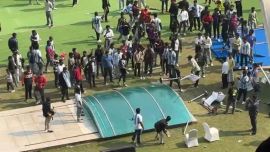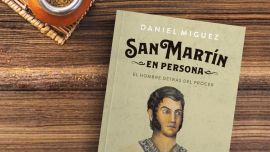More than an obituary (with the basics already written by James Grainger), these lines aspire to be a tribute to Maud Cox within the framework of three Ws – woman, wife and writer. While this newspaper’s obituary quite rightly centred on human rights, it would be dishonest for me to add anything there since I was not part of Bob Cox’s heroic team exposing the crimes of the 1976-83 military dictatorship – I only entered the Buenos Aires Herald in the last seven months of that dictatorship when it was already a dictablanda.
That Maud should reach the great age of 92 despite the multiple health problems plaguing her for several years now is already impressive and speaks volumes for her sheer vitality, but it is nevertheless not what impresses me most. What staggers me is how this mother of five and wife of over six decades could square that circle of shining without overshadowing her famous husband – in that cliché “behind every successful man there is a woman” the trickiest part is the preposition because how do you provide the ingredients for success without stepping into the limelight yourself? But for the outside world Robert Cox’s deserved fame was his alone – only tiny inner circles of family and friends had any inkling of Maud’s decisive role.
This remarkable woman and loyal wife shone by writing despite a brutal battle with blindness – a female John Milton. And it was my privilege to be sent every one of her works after publication for review in the Herald with the last three (Testimonios del antiguo pueblo de San Martín, the revival of Salvados del infierno, her most direct chronicle of dictatorship horrors written in 2001 and El misterio de las causalidades) appearing in the Times. Just those three books show that her spectrum was far from monothematic, however much the Cox name is considered synonymous with human rights. The San Martín book sketches vignettes from the first half of the past century decades before the district became part of today’s Greater Buenos Aires post-industrial slum belt while “El misterio” plays on the two almost identical Spanish words “causalidades” and “casualidades” being confused in reality as well as by switching a couple of letters – coincidences can be causal.
Other books spring to mind (Memorias desde el Puente Oberbaum and El exilio y el otro) but this is not the time or place to re-run reviews. Never a question of a bored housewife dabbling in letters because Maud took her writing very seriously as a skill to be acquired by study like others, acquiring a doctorate in literature while raising her brood of five and later teaching it in university. Writing was a compulsion which kept her vitality going into her 90th year.
Other than standing out as a wife, mother and writer, Maud Cox was a superb hostess and a bonus for any conversation, whether social or political with her shrewd analysis of current news and a memory capable of linking trends over several decades – not that she was one to mince words or suffer fools gladly. When this country was torn apart in the 1970s, her status as the wife of a human rights crusader coming from an upper-class family including an uncle who had been an Army general during the Peronist years (a military ethos perhaps contributing to her courage) made her uniquely placed to look at questions from all sides and that breadth of perspective continued into later years.
Forced to spend almost half her lifetime in exile in South Carolina, we can only be thankful that she should end her days in her homeland where they began and be grateful for her life as a whole.


















Comments